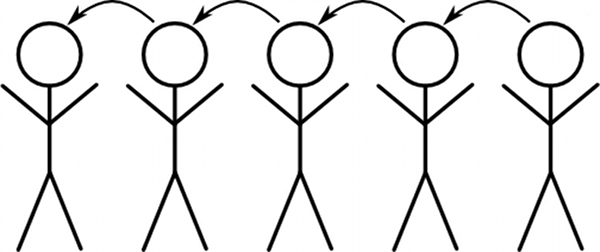Our education system is a massive Ponzi scheme. I may come across as a cynic for making this statement, and I may earn the ire of many, but bear with me for a moment. This is not a bad thing—in fact, it may be the only viable way to pass knowledge from one generation to the next.
My advisor recently came into my office, and bemoaned the poor quality of many of his students. We have had such conversations before, and spent a fair amount of time discussing why so many undergraduates are unprepared for college mathematics. He began the most recent dialog by drawing the following figure on my white board:

The traditional view of higher education is broadly outlined by this figure. The professor, on the far right, gives knowledge to her graduate students, who teach undergraduates, and so on. In this view of the educational system, it is the teacher’s job to ensure that the student learns.
The reality is somewhat different. Educators have long known that the best—and perhaps only—way to really master material is to teach that material to another. While a graduate student may be teaching calculus to an undergraduate, it is really the graduate student that is benefitting. He is mastering material that he probably only gained a cursory familiarity with as an undergraduate. The undergraduate students are a kind of place holder, and may just as well be goldfish, as the real student is the graduate TA.
Clearly, this is something of an exaggeration—we really do expect undergraduates to learn calculus in their calculus classes—but it highlights the importance of having graduate students teach. Moreover, it also demonstrates why it is vital that undergraduates be given opportunities to work as tutors, paper graders, and teaching assistants.
While the plural of “anecdote” is not “data,” I would like to share a bit of my own experience. During my first semester as a graduate student, I took a class in stochastic processes (i.e.\ random processes that evolve through time according to some probability model). A useful model of such processes is a Markov chain, which is understood by way of a matrix. Matrices, in turn, are one of the objects of study in an undergraduate linear algebra course. I took linear algebra as an undergraduate, but many of the tools that we used in the stochastic processes course were tools with which I only had a passing familiarity—I had to work hard to understand what was happening.
I realized that I had some holes in my linear algebra, so I talked to the professor about how I might fill those in. In addition to recommending a couple of books for me to read, he suggested that I grade papers for him over the summer. He was teaching linear algebra, and didn’t want to have to grade 30 papers every day. I accepted, and spent five weeks out of my summer grading papers and tutoring undergraduates. I now feel much more confident in my knowledge of the material, in a way that would not have been possible had I not been given the opportunity to teach the material.
This anecdote, and others like it, cause me to think that we can conceptualize education as a kind of pyramid scheme: in order to truly master material, students need to teach that material, which means that we need a constant supply of new students who are advanced enough to be taught the material that their tutors need to learn. The students are not the direct beneficiaries—rather, their teachers are. The students should gain some familiarity with the material, but we don’t really expect undergraduates to completely master trigonometry in a single semester—we expect them to master it later, when they teach it (or perhaps when they use it in their research, and have to explain their work to advisors and readers).
It is in this sense that education is a Ponzi scheme: we master material only insofar as we can teach it, and teaching is only possible when there are students to be taught. The proper functioning of our system of learning depends on a constant influx of new students who can act as the instruments of mastery for more advanced students. Eventually, they too should be given the opportunity to teach and master the material that they didn’t master as students.
